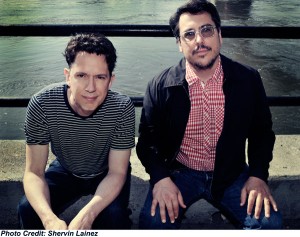They Might Be Giants, a Brooklyn-based alternative rock band that earned two Grammys since it began more than 25 years ago, calls its work “independent music for independent people.” The band’s two members, John Linnell and John Flansburgh, released a new studio album, “Join Us,” last July.
They Might Be Giants will perform at 7:30 p.m. Sept. 13 at The State Theatre downtown.
Staff Writer Evan Johnson spoke with Linnell about the band’s career, its new album and the experimental tone that has come to define its music.

Evan Johnson: How is the tour going? What are your expectations for it?
John Linnell: We’ve taught ourselves how to play about six songs, but we’re not in full tour readiness mode. We’re going to do a few more days of rehearsal next week and then we’ll be hitting road in the second week of September.
EJ: Tell me about the new album “Join Us.” How does it differ from your previous work?
JL: I think it’s as good as our previous work, but we didn’t articulate a theme to ourselves or an idea for it. The last album we had, which was produced by the Dust Brothers, had the closest we’ve ever come to having a whole schematic sound or a distinct quality. This is the winnowing down of a huge collection of material, and we picked the songs that would hang together properly. Other than that, I don’t think there’s a connective tissue.
EJ: Do you have a formula or technique you like to follow when you write songs?
JL: My method for probably the last twenty years has been that I write very quickly. I’ll set a time limit of maybe five minutes and I’ll try and cook up as much material in that time as I can for a song. And whether or not it’s coming together I’ll put it aside and move on. I can knock off maybe three or four reasonable sounding, good things in a sitting. And then I come back to this stuff later on, and I see what seems promising. For me it’s a very efficient way of getting work done because I need to get warmed up when I’m writing and usually the best stuff comes at the end.
EJ: Do you enjoy writing children’s music simply because it’s easier to write?
JL: When [we] first started working, we were worried we’d be confused with a kids act. When Tower Records got our first record, they actually put it with their kid’s music until we told them it wasn’t necessarily for kids. For two decades we worked really hard to define ourselves as a distinct and irreducible project that wasn’t necessarily what you thought it was. After doing that for long enough, we felt confident enough to say we could do a kid’s record without confusing anybody.
EJ: This spring will mark 30 years for TMBG. What do you attribute to the longevity of the group?
JL: It seems like most bands break up within five years, especially if they have a lot of success right in the beginning. The sense of disappointment starts to overtake them and they feel like they’ve done everything they were meant to do. We’ve been so unable to plan ahead in terms of our career. We just don’t make any clear goals for ourselves and that might be one of the reasons why we’re still hanging around.
EJ: What can people expect from TMBG at The State Theater?
JL: We haven’t worked out the live show completely but it will be a lot of new material — obviously. We always throw in some stuff for the people that have seen us a lot, but we’ll be playing some stuff that’s from the catalogue but hasn’t been done live. It’ll be the same band — me, John and the three guys we tour with — but John will have a beard.




